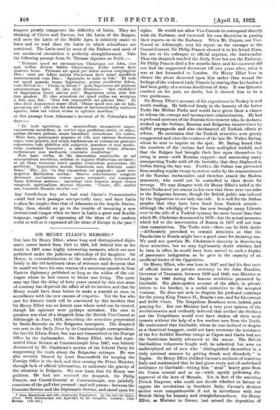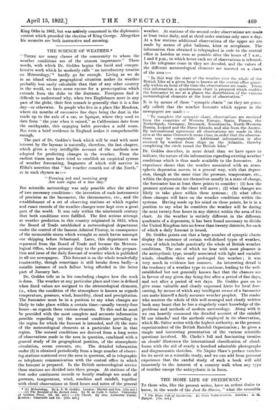SIR HENRY ELLIOT'S MEMOIRS.*
Tax late Sir Henry Elliot, whose long and distinguished diplo- matic career lasted from 1841 to 1884, left behind him at his death in 1907 some highly interesting memoirs, which are now published under the judicious editorship of his daughter. Sir Henry, in contradistinction to the modem diarist., believed so firmly in the old-fashioned ideas of reticence and decorum that he would not have his own version of a notorious episode in Near Eastern diplomacy published so long as the widow of the col- league whom he had reason to blame was living. The cynic may say that the delay of forty years caused by this nice sense of courtesy has deprived the affair of all its interest and that Sir Henry would have done better to make a scandal at once, in accordance with the new canons of etiquette. Yet the few who care for historic truth will be convinced by this incident that Sir Henry Elliot was an honest• man whose word can be trusted, though his opinions were perhaps mistaken. The case in question was that of a despatch from the British Vice-Consul at Adrianople in June, 1876, describing the atrocities perpetrated by Bashi-Bazouks on the Bulgarian insurgents. The despatch was sent to the Daily News by its Constantinople correspondent, the late Sir Edwin Pears, but was not transmitted to the Foreign Office by the Ambassador. Sir Henry Elliot, who had repre- sented Great Britain at Constantinople from 1867, was bitterly denounced by Mr. Gladstone's section of the Liberal Party for suppressing the truth about the Bulgarian outrages. He was also severely blamed by Lord Beaconsfield for keeping the Foreign Office in the dark and thus causing the Prime Minister, through lack of official information, to underrate the gravity of the situation in Bulgaria. We now learn that Sir Henry was guiltless. He had not received the despatch. Sir Philip Francis, our Consul-General at Constantinople, was painfully conscious of the gulf that yawned—and still yawns—between the Consular Service and the Diplomatic Service, and stood upon his • Some Revolutions and other Diplomatic Experience:. By the late Sir Henry With Introduction and Appendix by his Daughter. London: dohs Murray. Ms. net-1 rights. He would not allow Vice-Consuls to correspond directly with the Embassy, and exercised his own discretion in passing their reports on to the Embassy. When Mr. Dupuis, our Vice- Consul at Adrianople, sent his report on the outrages to the Consul-General, Sir Philip Francis showed it to his friend Pears, but not to his colleague or official superior, the Ambassador. Thus the despatch reached the Daily News but not the Embassy. Sir Philip Francis died a few months later, and his successor did not find the suppressed document till two years after, when it was at last forwarded to London. Sir Henry Elliot here in silence the abuse showered upon him rather than wound the feelings of the widowed Lady Francis by stating that her husband had been guilty of a serious dereliction of duty. It was Quixotic conduct on his part, no doubt, but it showed him to be a true gentleman.
Sir Henry Elliot's account of his experiences in Turkey is well worth reading. He believed firmly in the honesty of the better Turks like Midhat Pasha and would have given them a chance to reform the corrupt and incompetent administration. He had a profound mistrust of the Russian Government who, he declares, worked up the Serbian, Bosnian and Bulgarian insurrectiors by skilful propaganda and also checkmated all Turkish efforts at reform. He maintains that the Turkish atrocities were grcssly exaggerated and cites the evidence of the late Mr. Walter Baring, whom he sent to inquire on the spot. Mr. Baring found that the numbers of the victims had been multiplied tenfold, aid that the Bulgars had brought their fate upon themselves by rising in arms—with Russian support—and massacring many unsuspecting Turks with all the brutality that they displayed in Serbia during the late war. Further, the Sultan was prevented from sending regular troops to restore order by the remonstrances of the Russian Ambassador, and therefore armed the Moslem peasantry, who could not be controlled in their desire for revenge. We may disagree with Sir Henry Elliot's belief in the better Turks and yet concur in his view that there were two sides to the Bulgarian horrors, though the British public was induced by the Opposition to see only one side. It is well for the Balkan peoples that they have been freed from Turkish misrule— although the whirligig of time has now brought many Liberals over to the side of a Turkish tyranny far more brutal than that which Mr. Gladstone denounced in 1876—but the actual measures which led to the intervention of Russia in 1877 will not bear close examination. The Turks were—there can be little doubt —deliberately provoked to commit atrocities so that the Panslavists in Russia might have a good cause for declaring war. We need not question Mr. Gladstone's sincerity in denouncing these atrocities, but we may legitimately doubt whether, had he been in office, he would have been moved to such a display of passionate indignation as he gave in the capacity of an unofficial leader of the Opposition.
Sir Henry Elliot, who was born in 1S17 and had his first taste of official duties as private secretary to Sir John Franklin, Governor of Tasmania, between 1836 and 1840, was Minister at Naples in 1860 during the famous revolution promoted by Garibaldi. His plain-spoken account of the affair, in private letters to his brother, is a useful corrective to the accepted versions. He does not seek to disguise his profound contempt for the young King Francis II., Bomba's son, and for his corrupt and feeble Court. The Neapolitan Bourbons were, indeed, past praying for. But our Minister had a very poor opinion of the revolutionaries and evidently believed that neither the Skilless nor the Neapolitans would ever have shaken off their weak tyrants without the help of a few resolute men from the North. He maintained that Garibaldi, whom he was inclined to despise as a theatrical braggart, could not have overcome the resistance of the few faithful Bourbon troops at Capua and GaRa had not the Sardinians hastily advanced to the rescue. The British Garibaldian volunteers fought well, he admitted, but were an undisciplined set of men who " distinguished themselves in a truly national manner by getting drunk and disorderly " in Naples. Sir Henry Elliot disliked Cavour's methods of reuniting Italy and maintained that he had given every sort of underhand assistance to Garibaldi—letting him " steal " heavy guns from the Genoa arsenal and so on—while openly professing dis- approval of the hero of Marsala. Yet in face of the wavering French Emperor, who could not decide whether to favour or oppose the revolutions in Southern Italy, Cavour's devious tactics were comprehensible if not in accordance with our British liking for honesty and straightforwardness. Sir Henry Elliot, as Minister to Greece, just missed the &position of
King Otho in 1862, but was actively concerned in the diplomatic contest which preceded the election of King George. Altogether his memoirs are both instructive and amusing.



































 Previous page
Previous page